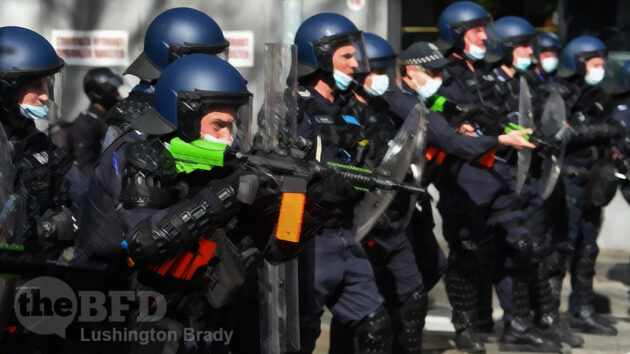If you don’t have a Silver level membership yet you are missing out on our Insight Politics articles.
Today is a FREE taste of an Insight Politics article by writer Chris Trotter.

Reasons to Riot
One Good Riot Is Worth a Million Earnestly Argued Pamphlets
THIS WEEK’S RUNNING BATTLES on the streets of Melbourne are a stark reminder that ideas have consequences. That the protesters constitute a minority of the Victorian population is indisputable, and yet their vociferous response to the Victorian Labor Government’s policy of compulsory vaccination has dominated both the news media and the consciousness of the Australian public. Even in New Zealand, the images of anger and violence have given the advocates of compulsory vaccination pause.
This is what nineteenth-century anarchists called “the propaganda of the deed”. One good riot, they said, is worth a million earnestly argued pamphlets. Nothing closes the circuit of political understanding faster, they then went on to prove, than blood shed in physical struggle. The modern terrorist is guided by very similar considerations. Reprehensible and profoundly evil though it was, 9/11 was also a propaganda coup of historic dimensions.
Riotous street protests and terrorist acts are, of course, the tactics of those who do not have – and are unlikely to secure – the support of a majority of the population. Extreme measures are simply not required, nor are they helpful, when it is clear to those in authority that most of the people are supportive of change. The one exception to this rule is when the authorities are hell-bent on imposing change without majority support. And when official intransigence is aided and abetted by a compliant intelligentsia and news media, extreme measures are all-too-easily presented as the only effective means of breaking into the public’s consciousness.
It would be a serious dereliction if the thoughts of the New Zealand Labour Government have not strayed down these speculative paths during the week just passed. After all, Labour is promoting a raft of radical policy changes most unlikely to emerge triumphant from any binding referendum. What’s more, in this defiance of majority opinion, the Labour Government is being materially assisted by senior bureaucrats, the universities and a significant faction of the mainstream news media. Any government so engaged, that has not given serious thought to how the majority might respond to being ignored and/or hectored in such a fashion, is truly asking for trouble.
One possible explanation for this Labour Government’s failure to apprehend the potential for serious problems ahead is the uncharacteristic weakness of the National Party Opposition. In normal circumstances, the proposed changes to the New Zealand health system; the confiscatory implications of the “Three Waters” proposal; and the cultural aggression manifested in the state-backed campaign to change the country’s name and sharply politicise the teaching of New Zealand history in the nation’s schools; would have fuelled an impassioned Opposition fightback. That its fightback has failed to fire appears to have convinced many who should know better that there is no electoral tinder for National’s rhetorical sparks to ignite.
There is, however, another possible explanation. It may be that the response of the mainstream news media to the National Party’s fightback against government policy simply smothered the flames by presenting them as racist and wrong-headed.
The policy suggestions contained in the He Puapua Report, for example, are by any measure extremely radical and freighted with the most serious constitutional implications. Historically, the exposure of such a government-commissioned document would have kindled a broad-ranging journalistic response. But, in 2021, the mainstream news media’s treatment of He Puapua has amounted to a belligerent “So?”
Rather than question the report’s recommendations, journalists questioned the Leader of the Opposition’s morality in objecting to them. The voters were encouraged to view Judith Collins’s response to the highly controversial issues of “co-governance” and the “Treaty Partnership” as evidence of her unfitness to govern. Smothered by the media’s ideological hostility, the Opposition’s attempt to initiate a genuine policy debate was stillborn.
It would, however, be a huge mistake on the Government’s part to construe the failure of National’s criticism to spark a negative response as proof that their policies enjoy broad public support. Accepting that proposition would contradict entirely Labour’s all-too-evident fear of the electorate’s judgement.
What other explanation is there for this Government’s unwillingness to engage openly with its ideological foes, but fear? If Labour believes the public are overwhelmingly on its side, then why does it shy away from allowing the public to pass judgement on its radical agenda in a referendum? If Jim Bolger could give New Zealanders a vote on the electoral system and John Key could give them a vote on the flag then why is Jacinda Ardern so reluctant to give New Zealanders a referendum on whether or not to upend the fundamental constitutional principles of their democracy?
In Melbourne this week, the passion and presence of young construction workers on the city’s streets has prompted a great deal of serious thinking and soul-searching across the whole of Australia. What the Victorian Liberal and National Parties have either not been willing, or not been allowed, to do, Australian larrikinism and its working-class’s ingrained hatred of “the big end of town” have done in spades. No matter how misguided, no matter how misinformed, the tradies’ riotous objections to Premier Daniel Andrews’s handling of the Covid-19 pandemic have made it impossible for his Labor Government to ignore them.
Jacinda Ardern’s Labour Government had better pray that New Zealand’s generally better-behaved citizens don’t catch the Melbourne virus. Because – God knows! – they have much better reasons to riot than their Aussie cousins.
If you enjoyed that FREE taste why not subscribe to a SILVER level membership today?
You will not only get access to Insight Politics articles like the one above but you will also gain access to all our puzzles, SonovaMin and BoomSlang’s fantastic cartoons, and our private members’ forum MyBFD as well as enjoying ad-free viewing.
$25 a month ($6.25 a week) (89c a day)
$300 a year

